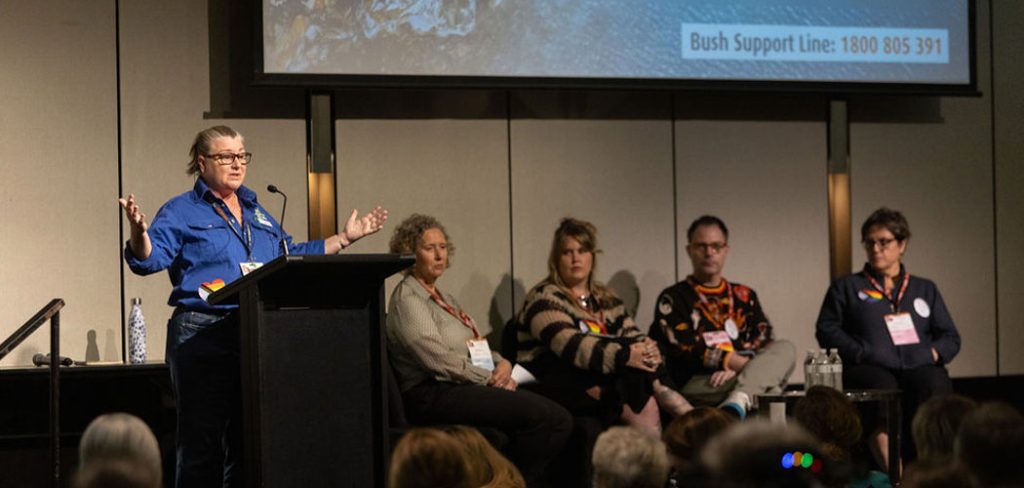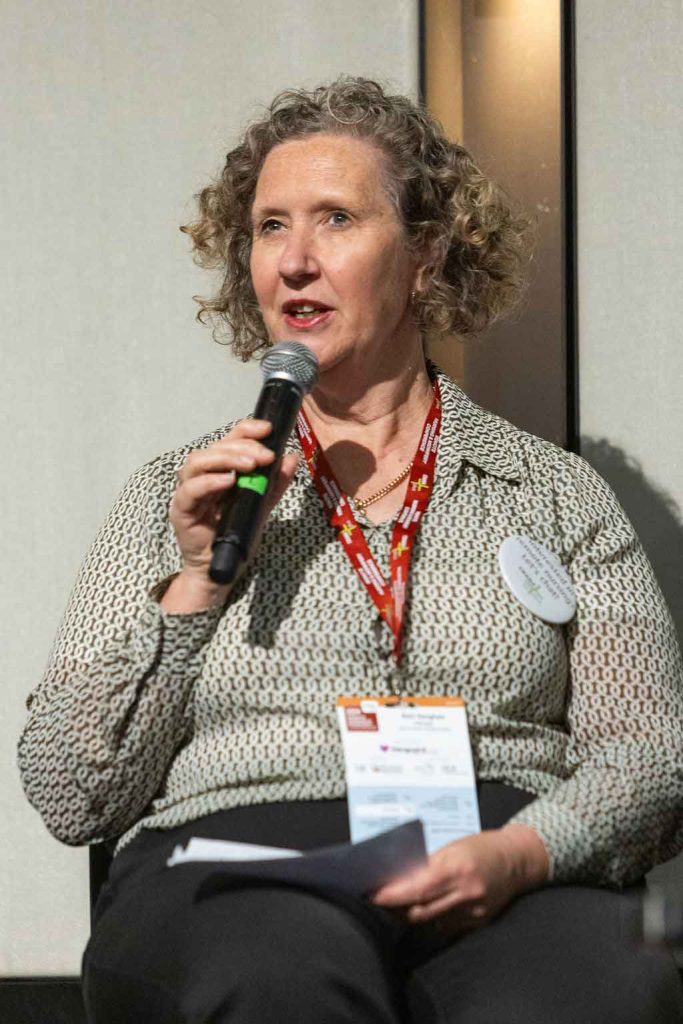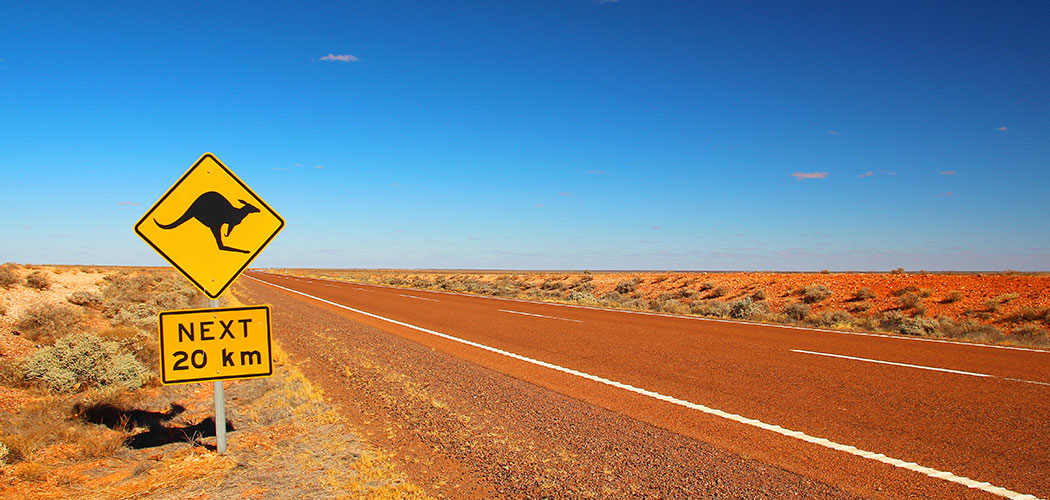When remote area nurse (RAN) Kellie Kerin was struggling at work, she turned to CRANAplus’ Bush Support Line for help. She credits the free and confidential 24/7 telephone support service, which gives all remote health workers, including nurses and midwives and their families, access to a psychologist experienced in the sector, with “saving” her life.
Sharing her experience as part of a panel at CRANAplus’ 2024 Remote Nursing and Midwifery Conference, held in Melbourne in October, Kellie reflected on a period in the late 90s/early 2000s when nurses often worked out bush alone, with limited equipment and other essential resources.
As the only nurse working in challenging clinics and communities, Kellie told delegates that she didn’t have the appropriate support networks to enable her to see the warning signs. Trauma on top of trauma eventually led to burnout and her body shutting down.
“I was a young remote area nurse, and I felt extremely lost,” she recalled.
“I was very desensitised and quite disassociated from my immediate surroundings.”
“[Calling the Bush Support Line] really provided the support I needed as I wasn’t in a good place. To have that 24/7 access, to know that the other people on the end of the phone had contextual knowledge of what I was experiencing and where, and geographically and all the things that come with that, [was essential]. The Bush Support Line was my number one go-to, because my friends, although supportive over the phone, they did not understand the context. RAN life is often perceived as an exciting, dynamic, and at times, a romanticised job and the true gravity and depth of the challenges faced often go unseen. The Bush Support Line is a very specialised service and they get it.”
The unique challenges of working in rural and remote
Senior psychologist with the Bush Support Line, Dr Nicole Jeffery-Dawes, who chaired the session, has worked across rural and remote for more than a decade.
According to Dr Jeffery-Dawes, the leading reasons people currently call the Bush Support Line include workplace and personal relationships, such as conflicts with colleagues or managers, support following a traumatic incident, and work demands, including a lack of support. Isolation is another major issue remote health workers face.
She assured delegates that no issue was too big or too small for them to pick up the phone for a chat.

“You may feel as though your problems are trivial at the time, and because of what’s happening around you, but they’re not trivial. We want to get you before you’re in crisis, so give us a call just to debrief, to chat, because that’s what we’re here for.”
A survey completed by conference delegates revealed a desire to increase knowledge and skills to support their mental health and wellbeing in the following areas:
- Preventing burnout
- Compassion fatigue
- Vicarious trauma
- Exposure to traumatic events
Why health workers keep working out bush

Panellist Josh Stafford, a registered nurse with many years of experience working rural and remote, initially struggled with the lack of resources. It took some time getting used to, however, once he did, he never looked back.
“I’ve been remote for many years now and the passion for what I do and the excitement for what I do every day is different, and I really thrive on that,” he told delegates.
“But I also have a deep belief in what I’m doing and what we’re all doing. I think that things are getting better in remote areas.”
Panellist Ann Vaughn, Health Services Manager at Harrow Bush Nursing Centre, recalled moving from a big city hospital in the mid-90s to rural Victoria and grappling with the culture shock.
“The first trauma comes in and I’m going, so where are the resources? Where’s that specialist that just used to walk in and say, this is what we’re doing? And then suddenly realising it’s me and a couple of GPs.”
Fast-forward, and it’s the sense of community forged over subsequent years that keeps Ann working rurally.
“I’ve returned home back to the country that I grew up in and it’s just wonderful knowing the generations. I know the grandparents, I know the parents, I now know the kids coming through that clinic and it’s a fabulous place to work.”
The importance of seeking help
At one point during her career, panellist Laura Berry, an RN with more than 13 years’ experience working rural and remote, suffered a “huge lack of motivation” and loss of self-confidence both personally and professionally.
“I think that when we reach that stage, it’s really hard to overcome,” she revealed.
In her line of work, dealing with situations like people and families experiencing psychotic episodes has had a significant impact on her mental health.
Reaching out to her colleagues for regular support helps, she has found.
“I have found clinical supervision to be really imperative to recovery from burnout. I avoided clinical supervision for a really long time, but it’s actually been really good in increasing my confidence and getting that back as a clinician.”
Similarly, for Josh, problematic challenges gradually crept up on him.
“I didn’t realise it was happening until it was sort of upon me and issues that normally I’d be able to handle became overwhelming. In a managerial position in a small community, it was very difficult for me to take time off and have downtime. So, those things that would normally not get to me, got to me.
“I have some very good friends around me, and also in my circle who are able to highlight that maybe, Josh, you’re not doing as well as you normally are, and what are you going to do about it and how can I help you to do something about it? For me, it’s very important to maintain those relationships outside of community and to be able to call upon those people when the time happens.”
One piece of advice for rural and remote health workers to help manage wellbeing
Josh encouraged delegates to live day by day and to try and find the joy, humour and love in each day and situation.
“I think we’re surrounded by so much adversity and angst, that I think it’s really important to look for the humour and for the love.”
Kellie suggested RANs follow their intuition and pick up the phone earlier.
“Don’t underestimate what’s truly going on for you because you know yourself better than anybody else. So, get your supports in early.”
Laura said it was important not to normalise things.
“We tend to do that and then I think we end up with compounded trauma and it can be really difficult to recover from. The other thing is to wrap yourself with really good mentors and good people in your life.”
To access the Bush Support Line click here or call 1800 805 391








